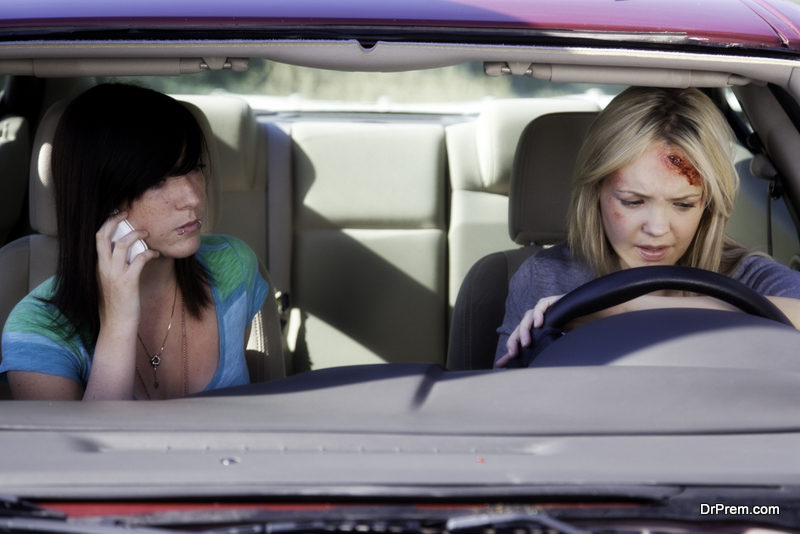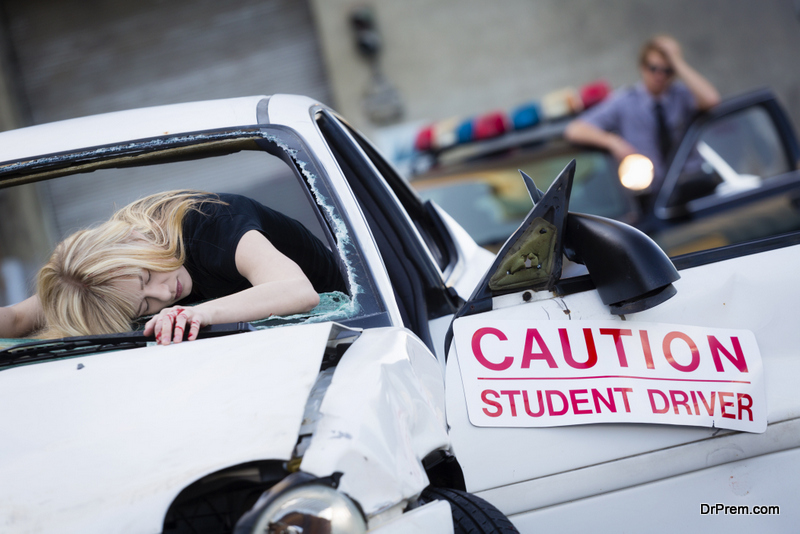As a parent, we never want to imagine that our children will be involved in car accidents. But at some point after your teen obtains their license, you will likely have to grapple with the dreaded post-accident phone call. In 2016, car accidents involving teens aged 15-19 made up only 6.5% of the U.S. population, but 8.4% of the total estimated costs of motor vehicle injuries. Though the severity of the accident may vary, there is a teachable moment to be carved out of every fender bender.
Obviously, the safety of your child is of the foremost concern post-accident. After ensuring that their immediate physical and psychological well-being is cared for by consulting with a physician, you can use this opportunity to lay the groundwork for your teen to turn into a responsible adult on the road.
1. Stop the Shame Spiral
 It’s almost inevitable that your teen will be involved in a car accident of some kind, and you as a parent have likely been involved in an accident at some point in your life, so it is unfair to hold your child up to the impossible standard of an eternally spotless driving record. Hopefully, before they first braved the world of driving, you had impressed upon them the importance of being an attentive and careful driver.
It’s almost inevitable that your teen will be involved in a car accident of some kind, and you as a parent have likely been involved in an accident at some point in your life, so it is unfair to hold your child up to the impossible standard of an eternally spotless driving record. Hopefully, before they first braved the world of driving, you had impressed upon them the importance of being an attentive and careful driver.
Now, all you can do is assure them that you understand that people make mistakes, and help them do better. Tell your teen that your number one priority is their safety and you will be there for them no matter what mistakes they make or have made. It is imperative to create an open dialogue with your teen about the accident. Regardless of whether the accident was their fault, you want your child to feel comfortable sharing these incidents with you. Cultivating a culture of fear will only reinforce the idea in your child that they must hide things from you to avoid retribution.
2. Share the Process
After the initial period of shock has abated, involve your child in the insurance claims process as much as you can without stressing them out further. The purpose of walking your child through all of the bureaucracy involved in processing accidents is to demystify the process and prepare them for any future accidents they may have as an adult. Doing so may also lessen the trauma involved in weathering a car accident, as it breaks the process down into manageable pieces. You don’t want your teen to be blindsided by the paperwork when they’re out on their own in the adult world.
If there are medical bills involved, be sure to wait until after the healing period is over before roping your teen into managing them. Their health must always take priority over everything else. There is a good reason to expose them to this unpleasant reality surrounding car accidents. Once again, letting your teen in on the ins and outs of health insurance, fault vs. no fault insurance, etc., gives them the tools necessarily to use these things to their advantage in the future. Just be sure not to share with your child the stress of managing and paying medical bills. While it may be an unfortunately stressful time for your family, you ought to take care not to place this burden on your teen.
3. Hiring a Lawyer
 In the same vein as involving them in the insurance claims process, talk to your child about when to hire a lawyer and the factors that go into this decision. Whether or not you need to enlist the services of an attorney depends on the nature of the crash. If your teen was in an accident involving a commercial vehicle, parents should seriously consider whether hiring an experienced attorney is the right option for them and their child.
In the same vein as involving them in the insurance claims process, talk to your child about when to hire a lawyer and the factors that go into this decision. Whether or not you need to enlist the services of an attorney depends on the nature of the crash. If your teen was in an accident involving a commercial vehicle, parents should seriously consider whether hiring an experienced attorney is the right option for them and their child.
There is no set amount of compensation to be expected across the board from claims involving commercial vehicles or trucks, but consult with an attorney immediately if you have reason to suspect negligence. Time is of the essence in cases such as these. Before the other party has time to delegitimize your claim, you want an experienced attorney on your side. “Because the specific details and value of each case is different, we cannot tell you what compensation you are owed without talking to you about the accident,” says one Corpus Christi truck accident lawyer. “That’s why it is so important to call us before the time runs out on your claim.”
4. Teach Defensive Driving
In addition to encouraging your teen to engage in talk therapy post-accident, enlisting your child in a defensive driving course is a great way to keep fear from paralyzing them on the road. You want to empower your child to make smart driving decisions—not ones made out of trepidation or anxiety. Exalt upon them the virtues of driving defensively through regular practice or, better yet, enlist the help of a licensed defensive driving teacher to alleviate the burden.
Article Submitted By Community Writer




